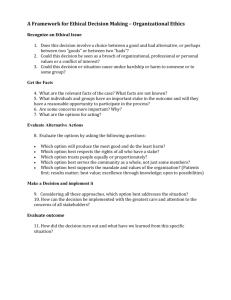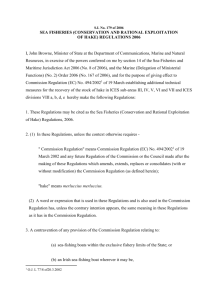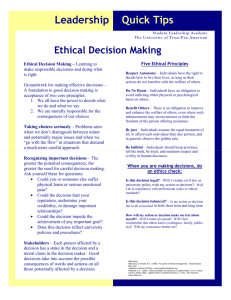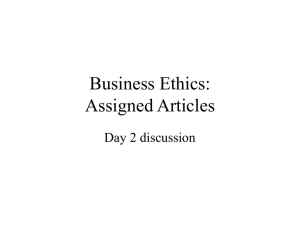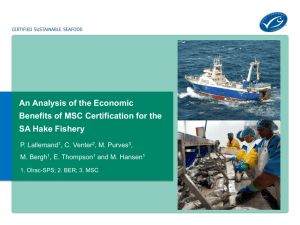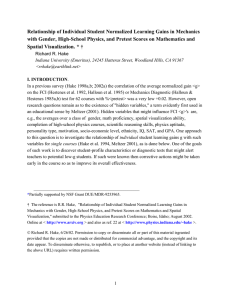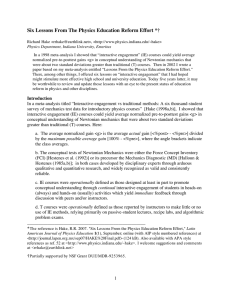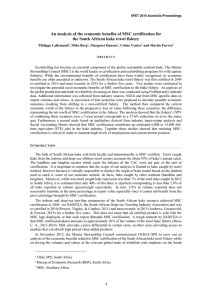Materials to Guide Reading
advertisement
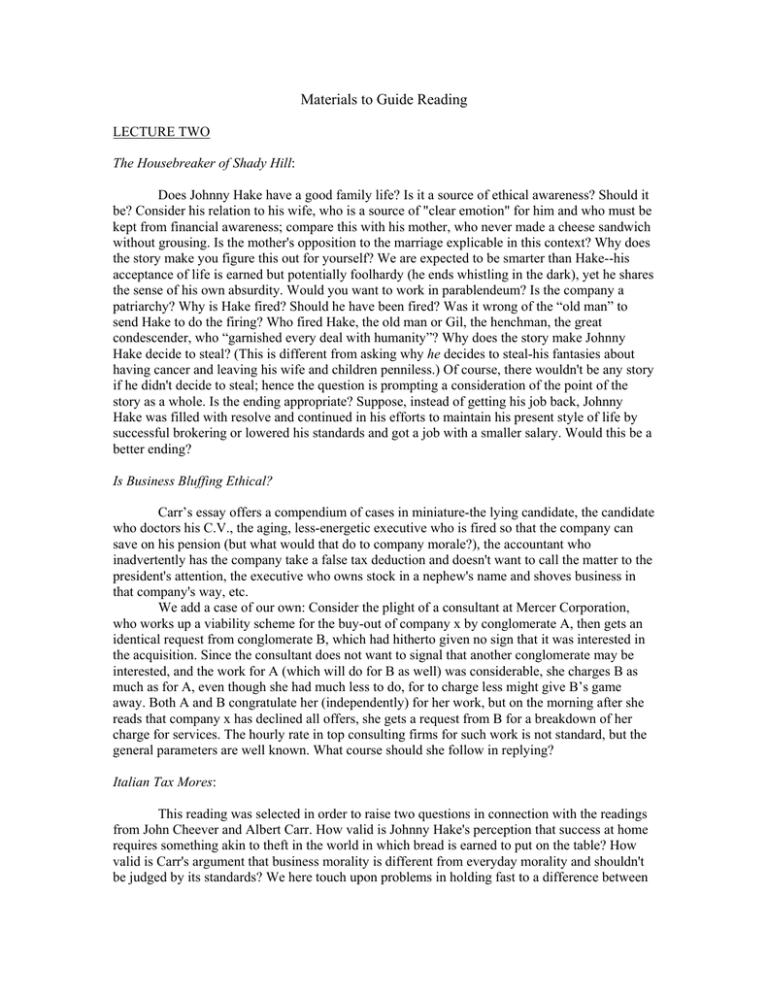
Materials to Guide Reading LECTURE TWO The Housebreaker of Shady Hill: Does Johnny Hake have a good family life? Is it a source of ethical awareness? Should it be? Consider his relation to his wife, who is a source of "clear emotion" for him and who must be kept from financial awareness; compare this with his mother, who never made a cheese sandwich without grousing. Is the mother's opposition to the marriage explicable in this context? Why does the story make you figure this out for yourself? We are expected to be smarter than Hake--his acceptance of life is earned but potentially foolhardy (he ends whistling in the dark), yet he shares the sense of his own absurdity. Would you want to work in parablendeum? Is the company a patriarchy? Why is Hake fired? Should he have been fired? Was it wrong of the “old man” to send Hake to do the firing? Who fired Hake, the old man or Gil, the henchman, the great condescender, who “garnished every deal with humanity”? Why does the story make Johnny Hake decide to steal? (This is different from asking why he decides to steal-his fantasies about having cancer and leaving his wife and children penniless.) Of course, there wouldn't be any story if he didn't decide to steal; hence the question is prompting a consideration of the point of the story as a whole. Is the ending appropriate? Suppose, instead of getting his job back, Johnny Hake was filled with resolve and continued in his efforts to maintain his present style of life by successful brokering or lowered his standards and got a job with a smaller salary. Would this be a better ending? Is Business Bluffing Ethical? Carr’s essay offers a compendium of cases in miniature-the lying candidate, the candidate who doctors his C.V., the aging, less-energetic executive who is fired so that the company can save on his pension (but what would that do to company morale?), the accountant who inadvertently has the company take a false tax deduction and doesn't want to call the matter to the president's attention, the executive who owns stock in a nephew's name and shoves business in that company's way, etc. We add a case of our own: Consider the plight of a consultant at Mercer Corporation, who works up a viability scheme for the buy-out of company x by conglomerate A, then gets an identical request from conglomerate B, which had hitherto given no sign that it was interested in the acquisition. Since the consultant does not want to signal that another conglomerate may be interested, and the work for A (which will do for B as well) was considerable, she charges B as much as for A, even though she had much less to do, for to charge less might give B’s game away. Both A and B congratulate her (independently) for her work, but on the morning after she reads that company x has declined all offers, she gets a request from B for a breakdown of her charge for services. The hourly rate in top consulting firms for such work is not standard, but the general parameters are well known. What course should she follow in replying? Italian Tax Mores: This reading was selected in order to raise two questions in connection with the readings from John Cheever and Albert Carr. How valid is Johnny Hake's perception that success at home requires something akin to theft in the world in which bread is earned to put on the table? How valid is Carr's argument that business morality is different from everyday morality and shouldn't be judged by its standards? We here touch upon problems in holding fast to a difference between business morality and morality, when it may seem that there might be overarching principles that cover both. Here are some further remarks: The issue raised by the case seems trivial. Why is the new branch manager so upset about a business practice which has the collusion of a legal authority and which doesn't seem to harm anyone in particular? Is there a case to be made that he behaved foolishly? (One should note that when the going assumption is that no honest or firm offer will be put on the table, there are penalties to being truthful. The system described in this case is a version of the Prisoner’s Dilemma and is not so easily challenged as one might suppose.) This discussion should prompt a number of questions. Does the collusion of legal authority make a difference to the ethical character of an action and if so, in what way? How important is the notion of harm to judging the ethical quality of a practice? Are there unethical practices without victims? Sometimes the effects of a practice is evident, the victims visible, the harm severe, but more often the effects are so distributed or parceled out that the harm seems trivial in any particular instance and/or the victims are invisible or far away. (This is the case in matters concerning pollution; everyone does it and the law colludes at much of it, and so you have no immediate ethical pressure to meet standards that will reduce earnings.) In this case, the harm is difficult to track. One might start considering the manager's response by trying to track it; a system of bribery is at work and at it is likely that someone, somewhere, at distance from the crime is paying the cost of this by bearing an unfair burden of taxes as a result. (The bribe, moreover, counts as a deductible business expense.) Then, too, there is the fact that “everyone does it”, a situation which usually carries the implication that if you don't do it, someone else will. Does this relieve you of an ethical responsibility? These questions are not meant rhetorically but as requesting reasoned answers. One sometimes gets somewhere in discussing such questions by changing the content but keeping the same structure-that is, by raising the ante, so to speak. Without actually presenting the case (I have in mind a problem in aircraft design akin to that recently fought out between Breakstone Tires and the Ford Motor company about who bears the cost of design-failure), just accept that the Federal Aviation Authority draws its inspectors from engineers currently employed by aircraft production firms. (This is true.) And now suppose that there is a powerful motive to wink at potential design flaws even when the inspector involved does not work for any of the companies concerned with manufacturing the plane that he or she inspects, simply because it is an industry practice to do so. Why pull a design off line-harming a competitor company and therefore giving the boat a considerable rock--when the evidence is not conclusive? Does the notion of possible fatality somewhere and sometime in the future alter the ethical case? Finally, we might alter the way the bribery works: You have performed a competent piece of consulting work (no more than competent) for Joyful Industries and the CEO, O. B. Joyful, invites you to his company's Christmas party, where he hands you an envelope marked “Happy Christmas” and murmurs, “To be opened at Christmas. Just a small token of appreciation”. You get back to your office and open the envelope: inside are ten crisp, new five hundred dollar bills. Your office mate, an old hand at the game, says: “Keep it. A few companies do it around here. He'll ask you for some information from time to time about other companies that use our services-nothing like industrial espionage, you understand, just a general sense of how things are going with rivals, what's most on their minds, that sort of thing. It's not as if you're going to be asked to reveal patented secrets or the contents of files marked confidential.” Do you keep the money? Or do you risk offending a client valued by your company by returning the money? Does the fact that the bribe is direct-not negotiated by agent to whom you pay a sum of money for the service-make a difference and if so, how?
